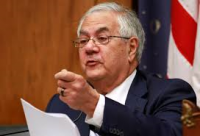Barney Frank
Country
United States
Birth - Death
1940 -
Occupation
Politics
Description
Barney Frank is a former Democratic Party member of the United States House Committee from 2007-2011. As such, he was a principal player in global efforts to manage the fallout from the 2008 financial crisis which threatened the financial stability of the world.
Frank graduated from Harvard College and the Harvard Law School. For a short time he taught undergraduates there until he was appointed Chief Assistant to Boston’s mayor, and subsequently assistant to a Massachusetts Congressman.
In 1972, Frank successfully ran for the Massachusetts State House of Representatives and remained active in state politics until 1980. At that time, he ran successfully for the U.S. House of Representatives. From 1984 to 2010 he handily won re-election twelve times. In 1987, he came out publicly as gay, being the first member of Congress to do so voluntarily.
Beginning in 2007, Barney Frank was appointed Chair of the House Financial Services Committee. In this role, he faced his most daunting political challenge with the threatened collapse of the American financial system following several serious financial events in 2008.
In September of that year, the sub-prime mortgage market (being the market for mortgages to low credit-worthy lenders) seized up because of an increasing number of mortgage defaults. This caused a liquidity crisis amongst the market’s financial participants. These included a significant number of the country’s largest mortgage providers, banks, investment houses, insurance companies, and others. Almost overnight, these financial institutions panicked and refused to lend money to each other in the normal course of their business operations. At the same time, home prices across the nation collapsed quickly.
The country’s central banker, The Federal Reserve, had to take emergency measures to address this liquidity crunch and restore confidence. It flooded the financial system with zero-cost-based loans to inject liquidity into the system. Several U.S. financial institutions collapsed or required rescue, including investment banks Bear Stearns, Lehman Brothers, and Merrill Lynch; the giant insurance company AIG; and mortgage lender Countrywide Financial.
The financial damage spread outside the U.S. due to the inter-connectedness of the global financial and monetary systems. Emergency programs had to be enacted by monetary authorities around the world. Many global financial institutions faced liquidity crisis and had to be rescued by their governments or closed down. The over-riding goal of market overseers, such as Barney Frank, was to stabilize the financial system as quickly as possible.
Both the U.S. and the world’s financial system were stabilized and a tentative air of normality returned. Barney Frank was intricately involved in negotiating the terms of several bailouts. Once stabilized, he had to turn his attention to analyzing the causes of the crash and enacting legislation to ensure the situation would not reoccur. The resulting legislation was called the Dodd-Frank Act.
This was an extensive piece of legislation. It proposed material changes to the oversight and regulation governing U.S. financial institutions, provided resolution procedures for large companies in distress, improved their capital requirements, enforced consumer financial laws, and more. For example, it prohibits the Federal Reserve from aiding any financial institution except through programs available to all on the same terms. It creates a Financial Stability Oversight Council to oversee financial institutions and to integrate the various regulatory agencies. The Act also increases the level of disclosure and functioning of corporate compensation schemes to inhibit excessive risk taking. It places more scrutiny on the operations of credit rating agencies. Finally, it changes the rules on the issuing of securitization product to make their risk more manageable.
The Dodd-Frank Act was passed in 2010. This brought the most significant changes to financial regulation in the U.S. in almost a century.
Barney Frank retired from his 32 years in public office in 2013. As a prominent member of the political and LGBTQ communities, he made history in many areas. His public service has been monumental and he was a participant in ensuring the stability of the global financial system.

